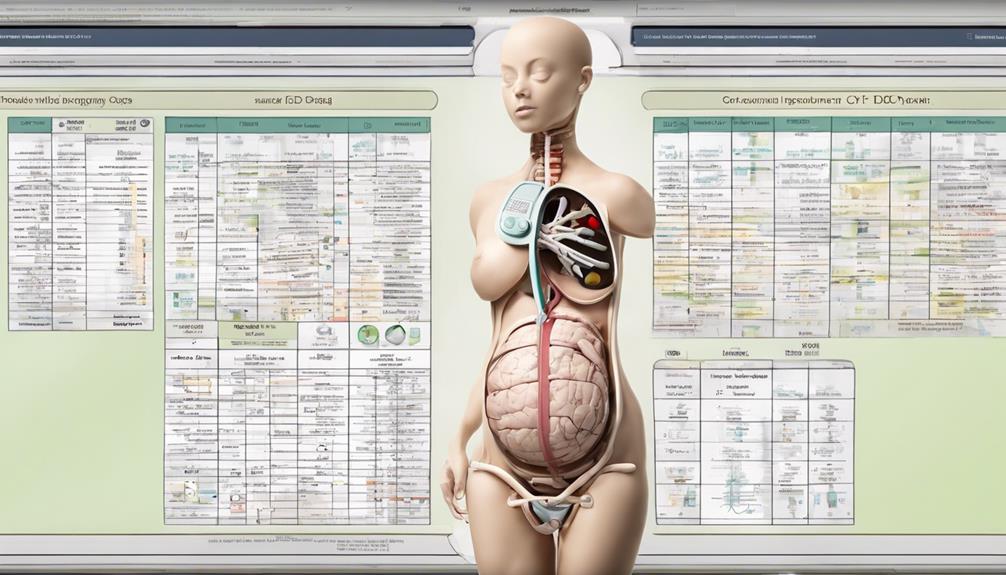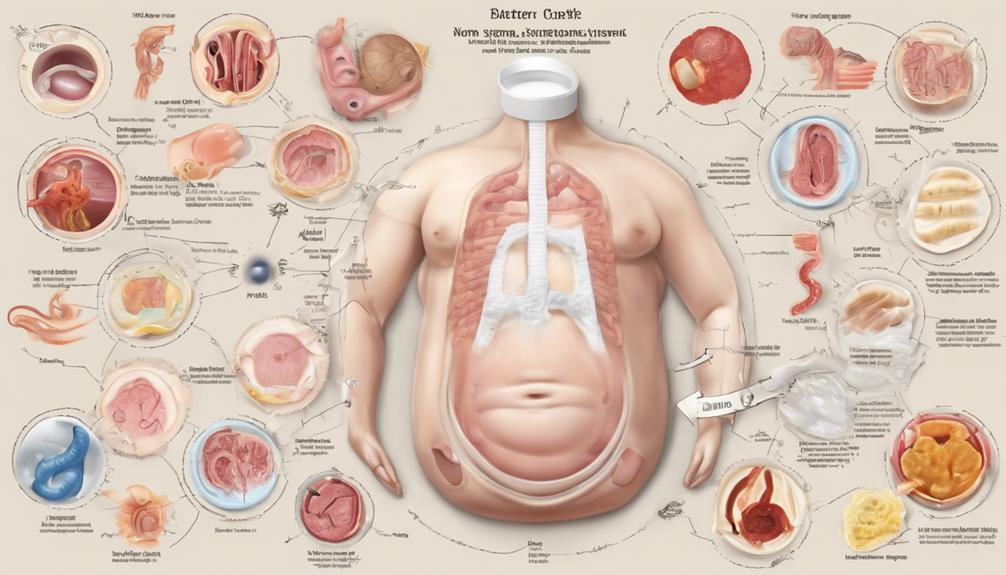As pregnant women, we understand the joy and excitement that comes with announcing a pregnancy. However, there are times when the thought of eating may not be as appealing as we would like.
The early stages of pregnancy can bring about a myriad of changes in our bodies, both physically and emotionally. These transformations often manifest in ways that affect our appetite, leaving us wondering why our usual food cravings seem to have disappeared.
So, what exactly could be causing this sudden shift in our relationship with food? Let's explore the ten reasons behind this common phenomenon and how to navigate through it for a healthier pregnancy journey.
Key Takeaways
- Hormonal changes reduce appetite and alter taste perception.
- Morning sickness and heightened smell sensitivity decrease appetite.
- Nutrient deficiencies and fatigue impact eating habits.
- Emotional stressors and digestive issues affect appetite levels.
Hormonal Changes
During the first trimester of pregnancy, hormonal changes play a significant role in altering appetite patterns and preferences. These changes involve an increase in human chorionic gonadotropin (hCG) levels, which can reduce appetite. Additionally, elevated progesterone levels contribute to feelings of fullness and decreased appetite by slowing down the digestive system. The fluctuation of hormones also leads to heightened sensitivity to taste and smell, causing aversions to certain foods and influencing overall appetite. Estrogen levels play a critical role in the brain's regulation of hunger and satiety, impacting appetite during early pregnancy.
Understanding these hormonal shifts is essential as they're also responsible for the development of morning sickness, nausea, and food aversions that can decrease the desire to eat in the first trimester. These changes may vary from person to person but are a natural part of the pregnancy journey. It's important to listen to your body and make choices that support your well-being during this time.
Morning Sickness

The experience of morning sickness in pregnancy commonly results in decreased appetite and food aversions for many expectant mothers. Morning sickness, characterized by nausea and vomiting, affects up to 80% of pregnant women in the first trimester. Hormonal changes, particularly the pregnancy hormone human chorionic gonadotropin (hCG), play a significant role in triggering these symptoms. Managing morning sickness through strategies like consuming small, frequent meals, using ginger products, and staying hydrated can help guarantee the discomfort associated with nausea and vomiting. However, in severe cases, medical attention may be necessary to prevent dehydration and guarantee adequate nutrition intake.
| Morning Sickness and Nausea |
|---|
| Affects up to 80% of pregnant women |
| Causes nausea and vomiting |
| Triggers decreased appetite |
| Managed by small, frequent meals |
| Requires medical attention in severe cases |
Food Aversions
Food aversions, experienced by a majority of pregnant women, can heavily impact their appetite and dietary choices.
Common triggers for aversions often include caffeinated beverages, meats, fish, and eggs.
Understanding coping strategies and alternative food options can help manage these aversions effectively.
Common Aversion Triggers
Experiencing food aversions during pregnancy is a common occurrence affecting a significant percentage of women, leading to dislikes for various food groups such as caffeinated drinks, meats, fish, and eggs.
Aversions to specific foods due to taste or smell can cause decreased appetite and meal avoidance.
Common aversion triggers include alcohol, coffee/tea, fatty foods, spicy foods, and strong-smelling foods.
Food aversions may peak between weeks 6 and 14 of pregnancy but can persist, impacting dietary choices and nutrient intake.
Managing food aversions involves trying different foods, seeking medical advice for persistent issues, and focusing on a balanced diet for maternal and fetal health.
Food aversions can present challenges, but understanding these triggers can help navigate this phase with better preparation and care.
Coping Strategies
Handling food aversions during pregnancy can be challenging, but understanding effective coping strategies is essential for maintaining a healthy diet and meeting nutritional needs.
Coping with specific food aversions involves trying different foods later in pregnancy if the aversions persist. It's vital to manage food aversions to prevent inadequate nutrition intake.
If persistent nausea or vomiting from food aversions leads to concerns about inadequate nutrient intake, seeking medical advice is recommended.
By actively managing food aversions and exploring alternative food options, it becomes possible to maintain a balanced and healthy diet during pregnancy.
Heightened Sense of Smell

Upon entering the first trimester of pregnancy, heightened olfactory sensitivity may lead to aversions towards certain foods due to overwhelming odors that were once tolerable. This heightened sense of smell, a result of hormonal changes, can trigger nausea and a loss of appetite.
Here are some insights to help navigate this challenging period:
- Avoid Strong Odors: Steer clear of heavily scented foods to minimize discomfort.
- Opt for Blander Options: Choosing milder, less aromatic foods may be more appealing.
- Stay Hydrated: Drinking water can help reduce the intensity of smells.
- Ventilate Cooking Areas: Make sure good airflow while preparing meals to lessen potent odors.
- Experiment with Different Cooking Methods: Grilling or baking foods instead of frying can help reduce strong smells.
Increased Fatigue

During the first trimester of pregnancy, increased fatigue is a common experience that can greatly impact appetite. Hormonal shifts and the body's heightened energy needs can contribute to feelings of exhaustion.
Managing fatigue is essential for addressing appetite changes and ensuring overall well-being during this important time.
Impact of Hormones
Experiencing increased fatigue due to hormonal changes is a common occurrence during the first trimester of pregnancy, impacting appetite and overall energy levels.
- Progesterone Influence: Rising levels of progesterone lead to management of smooth muscles, like the digestive tract, slowing digestion and affecting appetite.
- hCG Impact: Hormonal shifts, including hCG, contribute to feelings of exhaustion, making it challenging to feel motivated to eat.
- Appetite Changes: Hormonal fluctuations can result in reduced interest in food, leading to a decreased appetite.
- Managing Changes: Understanding hormonal influences on appetite can help handle and address eating habit changes during early pregnancy.
- Seeking Support: It's important to seek assistance and adapt eating patterns to accommodate the impact of hormones on appetite and fatigue.
Changes in Metabolism
Changes in metabolism during the first trimester of pregnancy often lead to increased fatigue, affecting appetite and energy levels. The body's increased energy demands for the developing fetus, combined with hormonal shifts, can leave pregnant individuals feeling exhausted.
These metabolism changes may result in decreased appetite and altered eating patterns, making meal preparation and eating seem overwhelming. To combat fatigue-induced appetite challenges, prioritizing adequate rest, staying hydrated, and consuming nutrient-dense snacks are crucial.
These snacks can provide quick energy boosts and help maintain stable blood sugar levels throughout the day. By being mindful of these changes and making small, nutritious choices, pregnant individuals can better manage their fatigue and support their overall well-being during the first trimester.
Nutrient Absorption Challenges
Handling nutrient absorption challenges in the first trimester of pregnancy can greatly impact energy levels and contribute to increased fatigue.
- Pregnancy hormones, like progesterone, can slow down digestion, affecting nutrient absorption and energy levels.
- Iron deficiency, common during pregnancy, can contribute to fatigue and a lack of appetite.
- Inadequate intake of essential nutrients like folate and vitamin B12 can worsen fatigue and decrease appetite.
- Proper diet and prenatal vitamins can address nutrient absorption issues, combat fatigue, and improve appetite in the first trimester.
Managing these challenges requires attention and care to make certain that both the mother and the growing baby receive the necessary nutrients for a healthy pregnancy.
Emotional Stress

Emotional turmoil during pregnancy may heavily impact one's appetite, potentially disrupting the intake of essential nutrients. It's common for emotional stress to lead to a loss of appetite, affecting food intake and nutritional needs. Feelings of anxiety, depression, and other emotional challenges can make it challenging to maintain a healthy diet during this important time. Stressors such as financial concerns, relationship issues, or worries related to the pregnancy itself can all contribute to changes in appetite.
During pregnancy, addressing emotional stress is essential for overall well-being. Seeking support from healthcare providers, counselors, or joining support groups can help manage the emotional challenges that may be affecting your appetite.
Digestive Issues

Getting through the first trimester of pregnancy can bring about various challenges, including digestive issues that can greatly impact appetite and overall well-being.
- Morning Sickness: Nausea and vomiting, especially in the mornings, can make eating unappealing.
- Nausea: Feeling queasy throughout the day can lead to a reluctance to consume food.
- Heartburn: The burning sensation in the chest and throat can deter you from eating certain foods.
- Hormonal Changes: Increased levels of hormones like hCG can disrupt digestion and cause discomfort.
- Food Aversions: Heightened smell sensitivity can trigger aversions to certain foods, affecting your appetite.
These digestive issues, from morning sickness to hormonal changes, can make meal times challenging. It's important to listen to your body, eat small, frequent meals, and avoid trigger foods to help manage these symptoms. Remember, these discomforts are often temporary and may improve as you progress through your pregnancy.
Metabolic Changes

During the first trimester of pregnancy, our bodies undergo significant metabolic changes that can impact our appetite.
Hormonal fluctuations, such as increased levels of hCG and progesterone, can disrupt our metabolic balance and reduce hunger signals.
These shifts in metabolism play a vital role in regulating food intake and can contribute to the decreased appetite experienced by many pregnant individuals.
Hormonal Imbalance
Throughout the first trimester of pregnancy, hormonal imbalances can significantly impact appetite regulation and metabolic processes.
- hCG Levels: Elevated hCG levels can disrupt appetite signals, leading to decreased food intake.
- Taste Perception: Increased progesterone levels can alter taste perception, contributing to appetite loss.
- Hypothalamus Influence: Hormonal shifts affect the hypothalamus, the brain's appetite control center, influencing hunger and fullness sensations.
- Gut Motility: Higher estrogen and progesterone levels can change gut motility and digestion, causing discomfort and reduced appetite.
- Nausea Triggers: Hormonal fluctuations in early pregnancy can trigger nausea and food aversions, further impacting appetite regulation.
Reduced Appetite Signals
The impact of metabolic changes on appetite during the first trimester of pregnancy becomes evident as hormonal shifts alter the body's signals for hunger and fullness. These changes can lead to a loss of appetite and food aversions, making it challenging to maintain a regular eating pattern. Hormonal fluctuations, particularly hCG levels, play a significant role in causing this decreased desire for food.
Additionally, taste alterations and heightened sensitivity to smells can further contribute to the changes in appetite experienced during early pregnancy. The body's prioritization of energy for fetal growth may also result in reduced maternal appetite, as it adjusts energy allocation to support the developing baby. Understanding these metabolic adaptations can help expectant mothers navigate the challenges of the first trimester with compassion and self-care.
Nausea and Vomiting

Experiencing nausea and vomiting is a common and challenging aspect of early pregnancy for up to 80% of expectant mothers. This can impact your daily life, especially when it comes to eating.
Here are some key points to ponder:
- Morning sickness: Known as morning sickness, these symptoms can lead to reduced food intake as the feelings of nausea make it difficult to eat.
- Medical attention: In cases of persistent vomiting, seeking medical attention is crucial to prevent dehydration and guarantee both your health and your baby's well-being.
- Decreased appetite: Nausea and vomiting can contribute to a decreased appetite during early pregnancy, making it hard to consume enough nutrients for you and your baby.
- Hyperemesis gravidarum: Severe morning sickness, known as hyperemesis gravidarum, can be especially challenging, leading to a substantial impact on your food consumption.
- Early pregnancy challenges: These symptoms are common in the first trimester and can make it tough to maintain a balanced diet, but remember, you're not alone in facing these challenges.
Changes in Taste Preferences

Adapting to changes in taste preferences during pregnancy is important for maintaining a balanced diet and ensuring adequate nutrition for both the expectant mother and the developing baby. Hormonal fluctuations play a significant role in altering taste perceptions, leading to food aversions such as coffee, meat, and eggs. These fluctuations can heighten sensitivity to flavors and smells, influencing food choices and overall appetite.
Many pregnant individuals also experience a metallic taste in their mouths, which can deter them from consuming certain foods. Emotional triggers further contribute to developing food aversions, impacting the enjoyment and intake of previously favored foods. Understanding these taste changes is essential for maneuvering nutritional needs during pregnancy.
Conclusion
While the first trimester of pregnancy can be challenging with loss of appetite, it's important to remember that this is a common experience for many women.
By addressing the various factors contributing to this issue and making small adjustments to your eating habits, you can still guarantee you and your baby are getting the nutrition needed for a healthy pregnancy.
Stay hydrated, focus on nutrient-dense foods, and don't hesitate to seek medical advice if needed.










